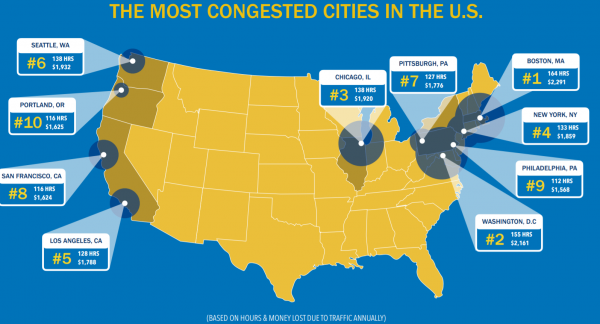February 12, 2019

Traffic experts have long deemed Los Angeles and Washington, where roadways are crowded for most of the day, as the cities with the most agonizing driving delays. But one report that dug down into a specific metric found that Boston might be the worst of them all.
Boston was named the most congested city in the United States in the INRIX 2018 Global Traffic Scorecard released Monday, the first time the Hub received such a dubious honor in decades of the company's reports.
The change is related to a new analytical approach. INRIX's 2017 report placed Los Angeles first and Boston seventh based on the amount of traffic across a full day, but the latest edition specifically measures time lost to congestion — in other words, travel time during rush hour minus what the travel time would be off-peak.
An average Boston driver lost 164 hours to peak traffic in 2018, worth about $2,291 in additional costs based on federal Department of Transportation estimates. Both figures were the highest in the country, followed by Washington with 155 hours and $2,161.
"Their geography, age and density create a road network that enters a severe state of breakdown once traffic strikes," the INRIX report found.
On these metrics, INRIX ranked infamously congested Los Angeles only fifth, citing an average annual loss of 128 hours and $1,788 to traffic.
"When people chanted 'Beat LA,' I don’t think this is what they had in mind," said Chris Dempsey, director of Transportation for Massachusetts, in a press release. "Being recognized as the worst region in the United States for traffic is a tough pill to swallow."
Combining various factors, INRIX's 2018 scorecard ranked Boston eighth among congested cities around the world. Moscow topped that list with an average of 210 hours lost per driver per year to traffic.
Transportation Secretary Stephanie Pollack said the INRIX report was concerning, but that state officials want to use a wider scope to address traffic problems. She pointed to a study launched by Gov. Charlie Baker last year to examine congestion, focusing on various aspects such as vehicle speed, overall travel time and roadway reliability. The study is expected to be completed in the spring.
"We didn't really need a report from INRIX to tell us that congestion is a growing problem in Massachusetts, particularly in Boston," Pollack said. "I think our goal is to understand why. Why is congestion worse? Because then for every why, there's something we can do differently."
The report was not all bad news for Boston, though. Per-driver rates were the worst, but the citywide cost of congestion was significantly higher in New York and Los Angeles. Other areas also have fewer alternatives to crowded roadways.
"Boston may incur the most significant costs in dollar terms, but a robust public transit system means alternatives exist for lower-income households," INRIX wrote. "In contrast, in a city like Houston (up to $1,365), many households depend on driving, which is more expensive on a per mile basis. Determining the true impacts of congestion is dependent upon a city’s unique economic profile and commute trends."
Pollack mentioned that public transit is also a key factor in congestion relief. The MBTA, which serves Boston-area transit customers, is the subject of constant debate over service quality, proposed expansions, the pace of improvements, the adequacy of its revenue base, and more recently, its latest fare increases.
Topics:


